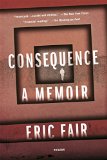Summary | Excerpt | Reviews | Beyond the Book | Readalikes | Genres & Themes | Author Bio

A Memoir
by Eric Fair
I have the booth scheduled for another hour and I don't have the energy this morning to start on someone new. So I take the time to ask the general about his life and learn what I can about Iraq. I do this with most prisoners, whether they have intelligence value or not. When I write the report, I'm supposed to call this the approach phase. I'm supposed to be building rapport. Some interrogators talk about how good they are at this, how they develop relationships with prisoners and come to some sort of understanding, opening lines of communication that will eventually produce good intelligence.
It's all bullshit. This is Abu Ghraib prison. The Iraqis hate all of us.
As I talk to the general about the village where he grew up, his service in the Iran-Iraq War, and how much he loves his sons, I ignore the memories from the previous night, when I interrogated a young man in one of the uncomfortable interrogation booths. I made him stand with his arms in the air until he dropped them in exhaustion. He lied to me, said he didn't know anything about the men he was captured with or the bomb that had been buried in the road. So I hurt him. Now I'm in a decent room serving decent tea and acting like a decent man. The comfortable interrogation booth is all I need to convince myself that the general and I are enjoying this conversation. I've fallen for my own stupid trick. When I pour the tea and turn up the heater, I complete the illusion.
As we drink our tea, the translator starts a conversation with the general about what it was like growing up as a Christian in Iraq and how her Muslim neighbors always took good care of her. I was an Arabic linguist in the Army, and while my language skills have faded, I understand enough to allow the translator to steer the conversation for a bit. The general says he was never very religious, but as he gets older he attends Friday prayers more often. The translator seems to like him. I do, too. I pretend the general feels the same way about me.
I talk about growing up in Pennsylvania and attending a Presbyterian church as a boy and how hearing the call to prayer from the mosques of Baghdad reminds me that I should be praying to my god more often. "No, no," the general says in English. "Not a different god. Same god. Same god." He points at both the translator and me. "We are same god."
The general and I are excited to discover that we are both former police officers, so we talk about how hard that job could be and how police officers are the ones everyone turns to when something goes wrong. He says he always thought about going back to police work, but now something is wrong with his kidneys and he has to take too many kinds of medicines.
I take too many kinds of medicines, too. I have heart failure. It cost me my job with the police department. I shouldn't even be in Iraq, but I'd been a soldier once, and I felt an obligation to be part of the war, so I lied during the physical and became a contractor. "Besides," I say to the general, "why do doctors only send healthy men to war?"
This makes the general laugh. He hates his doctors, too. He grabs his belly and shakes it and says the medicines make him gain weight. He says I look too healthy to be sick. But he says I should do what my doctors tell me. American doctors are much better than Iraqi doctors. I am too young. I have more life to live.
He asks more questions about where I am from. I shouldn't be letting him do this, but I've already lost control of the interrogation. I look to the translator. She says the general likes me and I should just keep talking and see what happens. I talk about Bethlehem, Pennsylvania, and the steel mill there, which just went bankrupt. He doesn't understand what I mean by "rust belt," so we talk about the dying industries and the closing factories. He says this is just like Iraq: no jobs and no place to work. There is no place for men to feel like men.
Excerpted from Consequence by Eric Fair. Copyright © 2016 by Eric Fair. Excerpted by permission of Henry Holt and Company. All rights reserved. No part of this excerpt may be reproduced or reprinted without permission in writing from the publisher.
Your guide toexceptional books
BookBrowse seeks out and recommends the best in contemporary fiction and nonfiction—books that not only engage and entertain but also deepen our understanding of ourselves and the world around us.